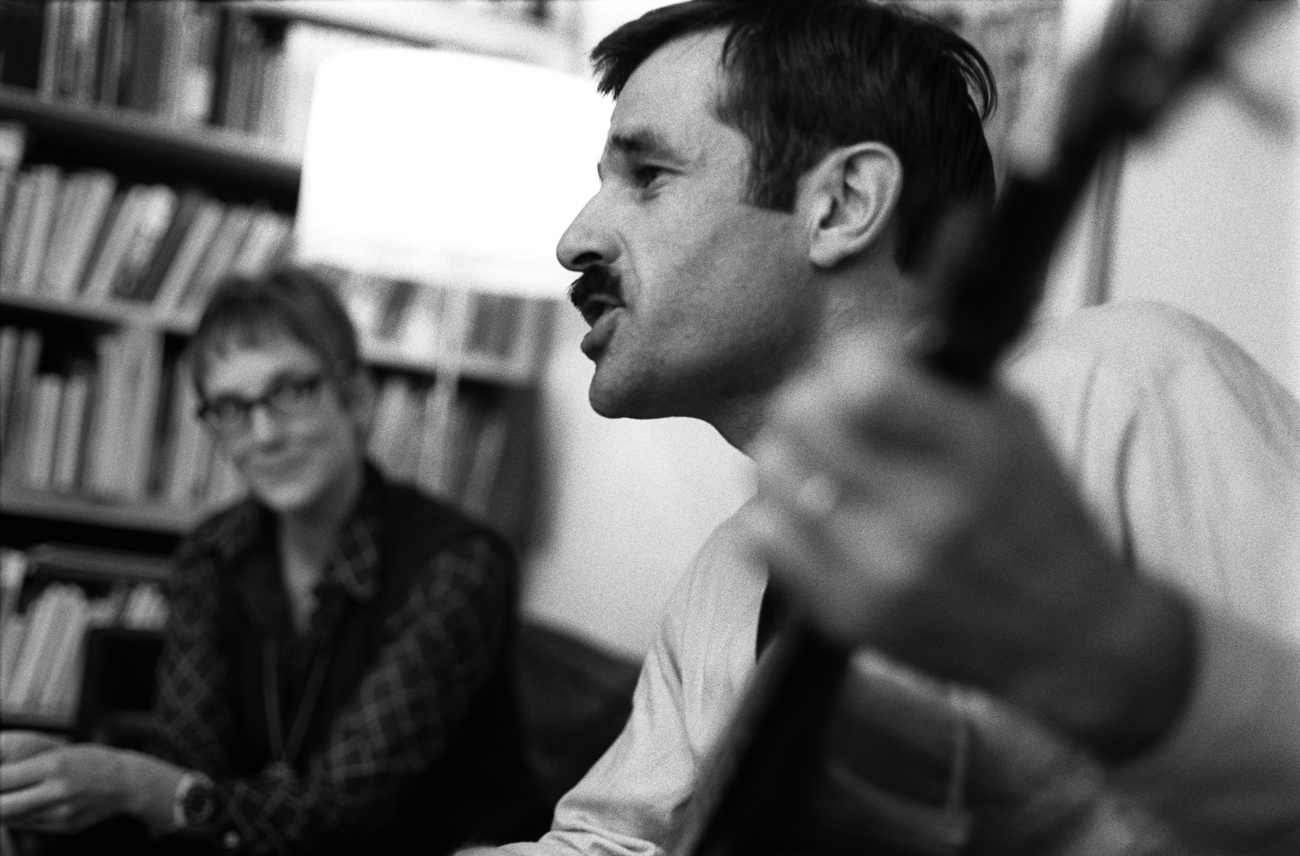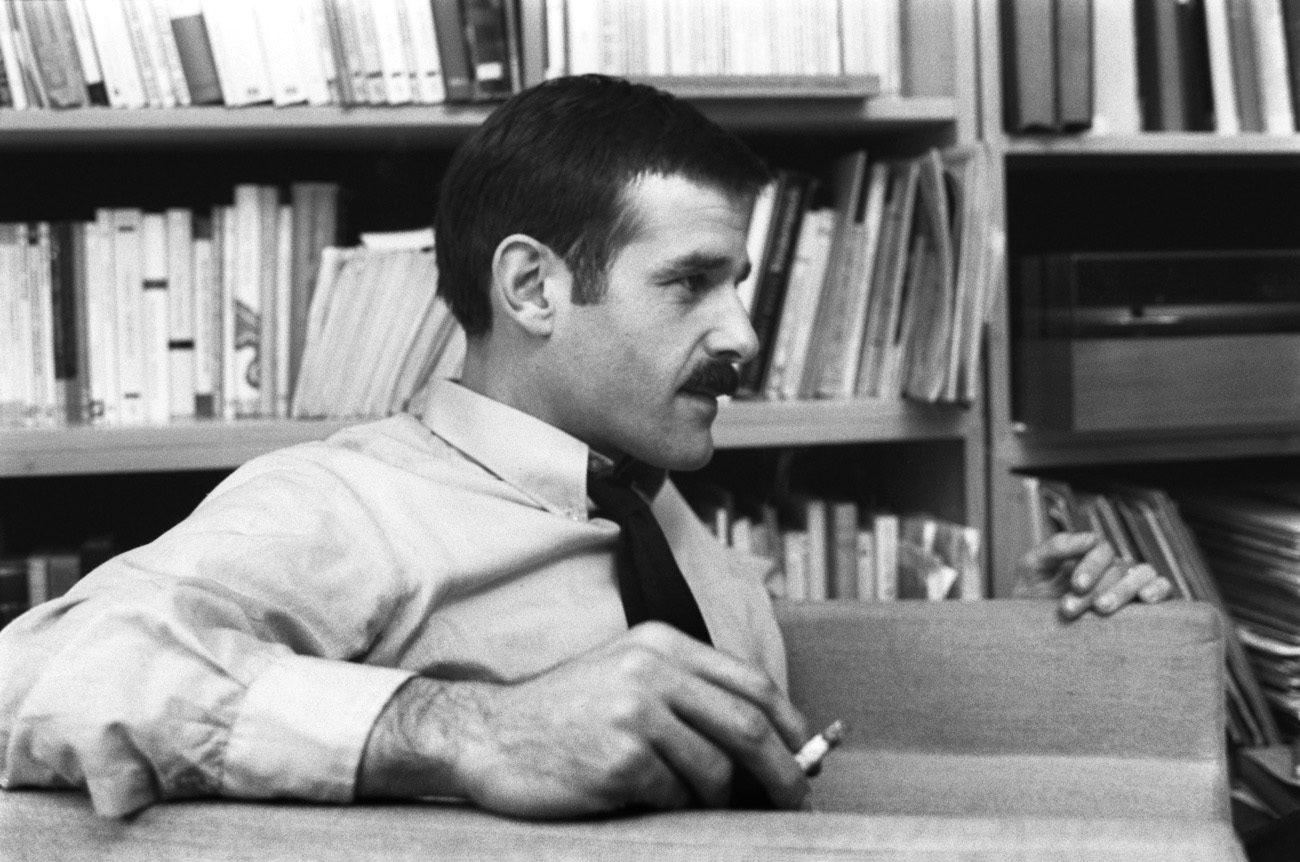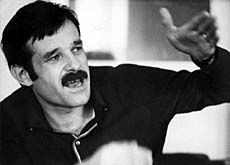What chansonnier Mani Matter can (still) tell us about Switzerland

Mani Matter, one of German-speaking Switzerland’s most beloved musicians, died exactly 50 years ago. Here’s why he still matters – and why his continuing popularity is worth dissecting, according to SWI cultural correspondent Alan Mattli.
Imagine Belgian crooner Jacques Brel singing about stopping a terrorist attack on the Palace of the Nation, which houses Belgium’s federal parliament, and coming to the conclusion that such an act of violent disruption may, in due course, prove necessary for the good of the nation. Even when accounting for the fraught nature of Belgian politics, it seems an unlikely proposition.
Now imagine the same scenario, but with a mellow, Brel-style chansonnier from Switzerland, who muses about how little it would take to destroy the Federal Palace in Bern, should its occupants fail to live up to the democratic values they profess to uphold.
What may seem like an outrageous stretch of the imagination, given Switzerland’s proverbial deference to the rule of law and reputation for low-key political discourse, requires zero mental effort from speakers of Swiss German.
That’s because the Swiss singer in question is Hans Peter “Mani” Matter and the song in which he weighs up the Federal Palace’s chances against “a few bags of dynamite” is called “Dynamit”. And like many other Matter songs, it is part of the music curriculum of primary schools in German-speaking Switzerland.
A longer posthumous life
Ever since he died, aged 36, in a car accident on November 24, 1972, Mani Matter has been one of Swiss-German pop culture’s foremost “consensus celebrities” – a largely uncontroversial, universally beloved figure who can be embraced by virtually anyone, no matter their ideological bent.

This degree of popularity might strike the uninitiated as a curious anomaly, given the explosive contents of a song like “Dynamit” – and it is indeed somewhat counterintuitive, as Matter was never one to shy away from letting politics inspire his songwriting.
His biggest hit, “I han es Zündhölzli azündt” (I Lit a Match), in an apparent nod to contemporary fears of nuclear Armageddon, imagines how a burning match falling onto a carpet might escalate into the end of humanity. “Hemmige” (“Inhibitions”) voices the hope that it’s human awkwardness that will keep the powerful from starting a catastrophic war.
“Är isch vom Amt ufbotte gsy” (He Was Summoned by the Bureau) and “Ballade vom Nationalrat Hugo Sanders” (Ballad of Parliamentarian Hugo Sanders) take to task Swiss bureaucracy and political inaction, respectively. Perhaps Matter’s finest work, “Dene wos guet geit” (Those Who Are Fine), is a disarmingly simple critique of economic inequality.
Yet to those who have grown up with Matter as a cherished relic, as the moustachioed uncle singing funny songs in black-and-white 1960s footage, the transfer from sly subversive to depoliticised national treasure appears perfectly natural: the posthumous Matter mythos, as promoted by school curriculums, several documentaries, and numerous tribute albums, is that of an artist who cheekily, if fundamentally innocuously, spoke truth to power in a long-dead era, and who is now, by virtue of his untimely death, safely confined to the nostalgic past of post-war Switzerland.
He has become, in effect, a non-threatening Swiss version of a countercultural protest singer.

The dialect hero
To be sure, Matter’s music lends itself to such an interpretation. His songs, sung in the famously dulcet Bernese dialect, are firmly rooted in the popular genre of contemporary chanson, dominated by the likes of Jacques Brel and Georges Brassens.
But while those Francophone troubadours’ fame transcended national borders, the cultural and linguistic specificity of Matter’s music meant that it was always destined to blossom only within the narrow borders of German-speaking Switzerland.
Indeed, to this day, his often-untranslatable Bernese idiom, immortalised in his swear word ode “E Löl, e blöde Siech, e Glünggi un e Sürmu” (A Boob, a Stupid Jerk, an Idiot, and a Crybaby) remains his most recognisable feature.
His lyrics, meanwhile, are mainly designed to amuse, telling small-scale stories of ill-fated attempts at painting (“Chue am Waldrand/Cow at the Edge of the Forest”), rogue alarm clocks (“Dr Wecker/The Alarm Clock”), or the “metaphysical horror” of finding oneself sitting between two mirrors (“Bim Coiffeur/At the Hairdresser’s”).
And although most of Matter’s songs function more or less explicitly as absurdist morality tales, gently ironic social commentary, or both – “Chue am Waldrand,” for example, illustrates the dangers of holding on to preconceived notions – their catchy guitar tunes and childlike rhyming couplets serve to make them widely palatable. A Mani Matter song with a message is, in a sense, more like a bedtime fairy tale than a typical 1960s protest song.
This impression is further compounded by Matter’s enduring stage persona: the live cuts that exist of his performances, such as the 1973 live album “Ir Ysebahn” (On the Train), suggest a soft-spoken, wittily self-deprecating man who bucks the image of the idealistic singer-songwriter by apparently lacking any pretensions about his work. Alongside the fact that Matter held a doctorate in law, taught at the University of Bern, and worked as the city’s legal consultant, this apparent professional humility surely had a hand in ensuring his bourgeois appeal.

Changing times and mores
There are hints in Switzerland’s public discourse, however, that 50 years after his death, Matter’s broadly uncontested status as a safe, conciliatory cultural icon is not as firm as it once was – and it was “Dynamit”, the song about blowing up parliament, that recently threw this into stark relief.
Last winter, as protests against Switzerland’s anti-Covid measures heated up, Matter’s veiled warning to the country’s high and mighty reared its head in anti-government rally speechesExternal link and threats directed at the Federal Office of Public HealthExternal link.
The appropriation may have been frivolous, but the effect was undeniable: it was as if “Dynamit”, and Matter along with it, had been yanked out of their cordoned-off display case, stripped of their untouchable iconicness, and violently reintegrated into present-day Switzerland, political polarisation and all.
With that kind of prologue, it would not be all that surprising to see Matter’s work going on to play a part in Switzerland’s current debates about wokeness and cancel culture too. In fact, German scholar Nicolas von Passavant has written a new bookExternal link in which he explores the politics of Matter’s writing.

Revisioning Matter
After all, some of his songs, such as “Ds Heidi” or “D Psyche vo dr Frou” (Woman’s Psyche), do espouse the kind of casual sexist attitude that was common in the 1960s. “Dr Eskimo”, meanwhile, ticks off conventional stereotypes about Inuit life, while “Dr Sidi Abdel Assar vo El Hama” (Sidi Abdel Assar of El Hama) features a generic Arab man unable to “afford” his preferred wife.
Both are prime examples of Western art’s clichéd depictions of “foreign” cultures (though in the case of “Sidi”, Matter’s introduction emphasises his own limited perspective on the subject matter).
Critically interrogating this aspect of Matter’s legacy is essential, not least because of his afterlife as a classroom fixture. However, Switzerland’s political climate, which has followed the international trend towards polarisation and controversy about how to confront “problematic” behaviour and historical figures, makes it doubtful that the ensuing discussion would be a productive one.
If the recent public reckonings with cultural appropriation and Zurich’s monuments to the international slave trade are any indication, it would not be surprising if this kind of scrutiny of Matter provoked feverish headlines warning of “politically correct censorship”.
Indeed, it would almost seem like the logical consequence of his 50-year-old mythos, as a nation raised to view Matter as an unassailable national treasure baulks at the prospect of seeing him and his work in a more nuanced light.
One of the many posthumous Mani Matter references: Swiss indiepop quintet The Bianca Story teamed up with Dieter Meier (of Yello fame) for the song “Does Mani Matter?” (2013).
Edited by Mark Livingston

More
The music still plays on for Mani Matter

In compliance with the JTI standards
More: SWI swissinfo.ch certified by the Journalism Trust Initiative









You can find an overview of ongoing debates with our journalists here . Please join us!
If you want to start a conversation about a topic raised in this article or want to report factual errors, email us at english@swissinfo.ch.